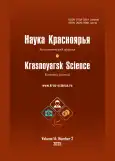Digitalization of human resource management: current trends and challenges for Russian enterprises
- Autores: Chernyakov M.K.1,2, Chernyakova I.A.2
-
Afiliações:
- Siberian University of Consumer Cooperation
- Novosibirsk State Technical University
- Edição: Volume 14, Nº 2 (2025)
- Páginas: 166-186
- Seção: Articles
- ##submission.datePublished##: 30.06.2025
- URL: https://journal-vniispk.ru/2070-7568/article/view/304214
- DOI: https://doi.org/10.12731/2070-7568-2025-14-2-297
- EDN: https://elibrary.ru/YPKICO
- ID: 304214
Citar
Texto integral
Resumo
In the context of global digital transformation, human resource management (HRM) is undergoing significant changes, requiring scientific understanding and adaptation of management practices. The article presents a comprehensive analysis of current digitalization trends in Russia, their impact on the efficiency of personnel processes, and the challenges faced by enterprises. The study is based on a systematic methodology, including content analysis of scientific publications, regulatory documents, and comparative analysis of data from Russian and international reports. The research results identified four key areas of HRM digitalization: the use of artificial intelligence (AI) for automating recruitment, personnel assessment, and workforce planning; the implementation of cloud technologies enabling flexible data storage and processing; the gamification of training and onboarding, enhancing employee engagement and accelerating their integration into the corporate environment; the development of digital platforms for managing internal communications, document flow, and personnel analytics. Despite evident advantages such as reduced operational costs and improved accuracy of HR decisions, the digitalization process faces several barriers. These include employee resistance to change, cybersecurity risks, the need to revise labor standards, and ethical concerns related to the use of AI algorithms. Special attention is given to regional specifics: while large companies actively adopt innovations, small and medium-sized businesses lag due to high technology costs and a shortage of qualified personnel. The findings of the article can be applied in shaping corporate strategies, government programs to support business digitalization, as well as in educational courses on HR management and IT.
Sobre autores
Mikhail Chernyakov
Siberian University of Consumer Cooperation; Novosibirsk State Technical University
Autor responsável pela correspondência
Email: bookkeep@sibupk.nsk.su
ORCID ID: 0000-0002-9837-4849
Código SPIN: 2681-5230
Scopus Author ID: 57214115901
Researcher ID: A-4325-2018
Head of the Department of Applied Informatics and Data Economics, Doctor of Economics, Professor; Professor, Department of Audit, Accounting and Finance
Rússia, 26, K. Marx Ave., Novosibirsk, 630087, Russian Federation; 20, Karl Marx Ave., Novosibirsk, 630073, Russian Federation
Irina Chernyakova
Novosibirsk State Technical University
Email: i.chernyakova@corp.nstu.ru
ORCID ID: 0000-0003-0191-0447
Código SPIN: 5213-8647
Scopus Author ID: 57218092667
Researcher ID: ABF-1761-2020
Associate Professor of the Department of Management, PhD in Economics
Rússia, 20, Karl Marx Ave., Novosibirsk, 630073, Russian Federation
Bibliografia
- Ablitarov, E. R., & Tsvetkova, I. I. (2022). Key trends in personnel management processes digitalization. Economic Research and Development, (10), 17–24. Retrieved from http://edrij.ru/article/05-10-22. https://doi.org/10.54092/25420208_2022_10_17 EDN: https://elibrary.ru/VCLNKI
- Bugasova, E. V., & Shichkin, I. A. (2024). Current trends in personnel management processes digitalization. Journal of Monetary Economics and Management, (8), 239–246. EDN: https://elibrary.ru/DRFCKP
- Drap, E. S., Koneva, D. A., & Mezhina, M. M. (2020). Digitalization in HRM: Challenges, prospects, technologies. In Digital Transformation of Society, Economy, Management and Education: Proceedings of the International Conference (Ekaterinburg, December 5–6, 2019) (vol. 1, pp. 42–48). Sedlčany: Ústav personalistiky.
- Koryakina, T. V., & Volodina, A. I. (2023). Digital technologies in HR management: key areas of development and influential factors. EFO, (3), 37–60.
- Lomonosova, N. V., & Yakimova, E. A. (2020). Status and prospects of using digital HR tools by Russian companies. Open Education, (4), 47–55. https://doi.org/10.21686/1818-4243-2020-4-47-55 EDN: https://elibrary.ru/UOIFGL
- Makarova, E. A. (2022). Key technologies of digital transformation in HR: trends in personnel management in Russia. International Research Journal, (1-3), 30–34. https://doi.org/10.23670/IRJ.2022.115.1.075 EDN: https://elibrary.ru/HINHZH
- Strategy for the Development of Information Society in the Russian Federation for 2017–2030 years: Decree of the President of the Russian Federation No. 203 of May 9, 2017. Collected Legislation of the Russian Federation, (20), Art. 2901. Retrieved from https://base.garant.ru/71670570
- Russian IT Market in 2024: Analytical Report. (2024). Interfax. Retrieved from https://www.interfax.ru
- Tatevosyan, S. A. (2023). HR-digitization: main areas of development and influential factors. Bulletin of St. Petersburg University. Management, (1), 37–60. https://doi.org/10.21638/11701/spbu08.2023.103 EDN: https://elibrary.ru/RESDWW
- Tachanova, K. G., Myagkova, S. E., & Pashkevich, Yu. Yu. (2021). Current trends in digitalization in personnel management. UPIRR, (3), 61–67. https://doi.org/10.12737/2305-7807-2021-10-3-61-67 EDN: https://elibrary.ru/GWCDHN
- Trofimova, N. N. (2024). Analysis and systematization of key advantages of digital transformation of human resource management in terms of social, economic, and innovation aspects. Economics and Management: Problems, Solutions, 9(10), 126–134. https://doi.org/10.36871/ek.up.p.r.2024.10.09.014 EDN: https://elibrary.ru/RUCEGT
- Abashkin, V. L., Abdrakhmanova, G. I., Vishnevsky, K. O., Gokhberg, L. M., et al. (2024). Digital Economy: 2024: Brief Statistical Digest. Moscow: ISSEZ HSE. 124 p.
- Yandex.NeuroStat. (2024). Generative neural networks usage statistics. Retrieved from https://ya.ru/ai/stat
- Davenport, T. H., & Ronanki, R. (2018). Artificial Intelligence for the Real World. Harvard Business Review, 96(1), 108–116.
- Global Digital Trends 2024. (2024). GSMA Intelligence. Retrieved from https://www.gsmaintelligence.com
- Kaplan, R. S., & Norton, D. P. (1996). The Balanced Scorecard: Translating Strategy Into Action. Boston: Harvard Business Press. 322 p.
- World Population Prospects 2024: UN Report. (2024). United Nations. 120 p. Retrieved from https://population.un.org/wpp
Arquivos suplementares










